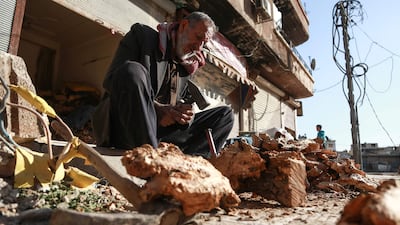The tension between long-term planning and short-term demands is not new. Prioritisation in policy-making and resource allocation is necessary for any serious endeavour to succeed, let alone the fate of countries and their populations. The advancement the tech industry has made has led to an acceleration that few planners can keep up with. Too many geopolitical crises are being dealt with in a reactionary manner, with little prospects for a long-term solution. At a time when technological advances mean that the speed of events and their perceived impact leave people unsettled, the Middle East is facing increased uncertainty and fragmented conflicts. A framework for a regional order and vision is needed today more than ever, and yet seems unlikely to come about any time soon. For those who seek prosperity and stability in the region, putting out the fires of armed groups, expansionist countries and internal disorder means that instead of designing the future, we are trying to rebuild a basic present.
Syria, for example, has had a UN-endorsed plan since 2012 aimed at ending its senseless war, and yet short-term incentives and interests have stood in the way of realising it. The result is that more than 12 million of its people have been displaced, with hundreds of thousands killed and wounded. And while the UN gets ready for another round of talks on Syria at the end of this month, and the US and Russia make general statements about the need for a "political solution", no real solution is on the horizon. Perhaps because how a "solution" is identified remains lacking. While stopping the bloodshed is vital, it is nowhere near enough. Reconstructing societies and building villages and cities on new foundations with a functioning social contract does not appear on the cards. Power for those whose fight was bloodiest, and a destruction for the vanquished, is not a durable solution.
While every day our headlines remind us of the very immediate chaos and threats in areas of war and conflict, the responsibility of long-term planning cannot be neglected. A disconnect between these developments and the virtual world of technological advancement Is adding to the disadvantage of those who could be left behind.
Last weekend, I had the opportunity to learn about some of the best practices from governments, multinational corporations, the media industry and other key sectors that make up our world. And yet many of these may not be relevant in a decade or even a year, as the Fourth Industrial Revolution overturns, or disrupts, many of our norms. Over two days of discussions at the annual meeting of the Global Future Council of the World Economic Forum, held in Dubai, experts discussed how the next decade will be shaped by technological revolutions – including "human enhancements" and the use of big data in every aspect of life. Seven hundred experts were challenged to think of 2030 and a shared future within that 13-year timeline. Vision 2030, the same title used by Saudi Arabia for its mapping of the future and the deadline for reaching the UN's Sustainable Development Goals, was to be a guide in all discussions. And yet, those who are toiling with the need to find shelter, food and a gainful income, looking beyond the immediate present is difficult. Thus the onus is on those with the privilege of security and prosperity to build a more equitable system for those who do not have a voice in centres of power. And they must remember the important adage that power comes with responsibility. This includes keeping in mind the needs and rights of all sections of society, many of whom don't relate to the terms or ideas being promoted.
So while we speak of the need for population mobility, more than 60 million people are dealing with the trauma of displacement, losing their homes or even their identity, with the loss of vital documents and citizenship rights.
Executive after executive calls for an improved "talent pool", to build the future we aspire to, and bemoaning the difficulty of finding "the best talent". Simultaneously, we have millions of young, smart and capable young people in search of jobs, but unable to find the right opportunity because they were not fortunate enough to have attended the best universities or were born in the wrong country.
From the World Bank to the World Economic Forum, the issue of "inclusive growth" is addressed time and time again. And yet there are real levers that can enable such growth and can bridge the growing wealth gap.
The challenge of long-term planning, with agility to enable immediate actions, remains present across sectors but is needed more than ever to end the conflicts of the region. A tangible example lies in the next round of Geneva talks on Syria. Those meeting would benefit from new approaches in peace-building. There is much to be learned from innovators in the tech industry and those lessons must be related to the very real and tangible concerns of ordinary people.


